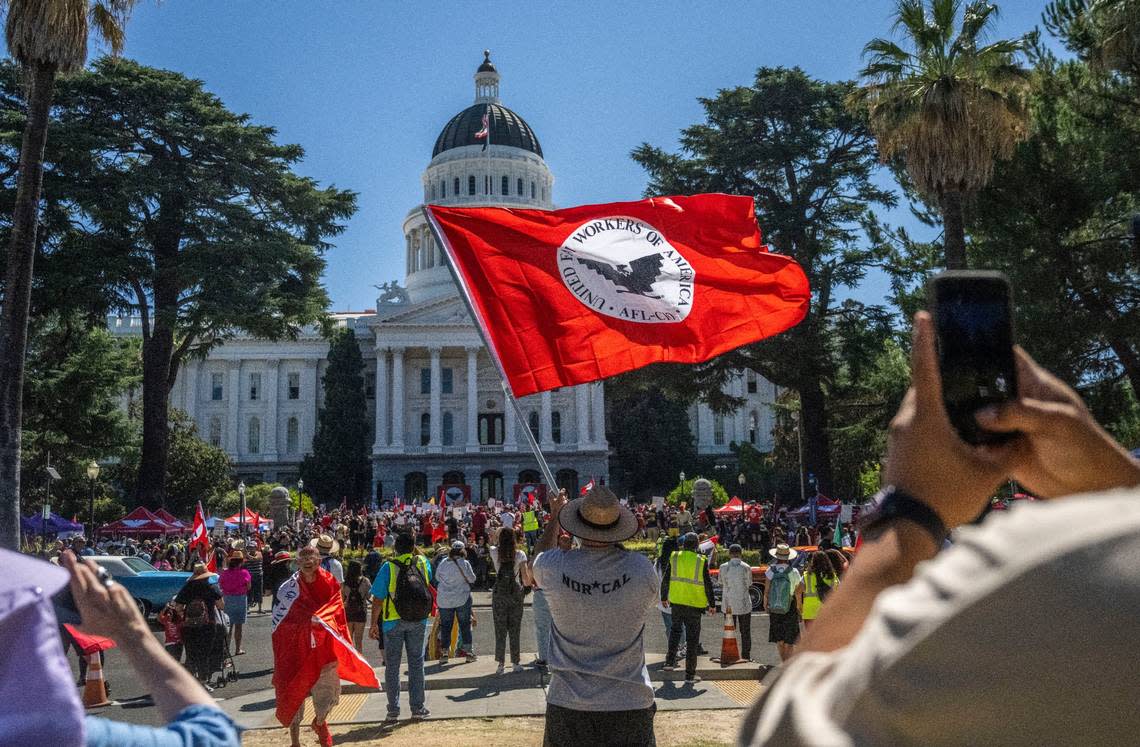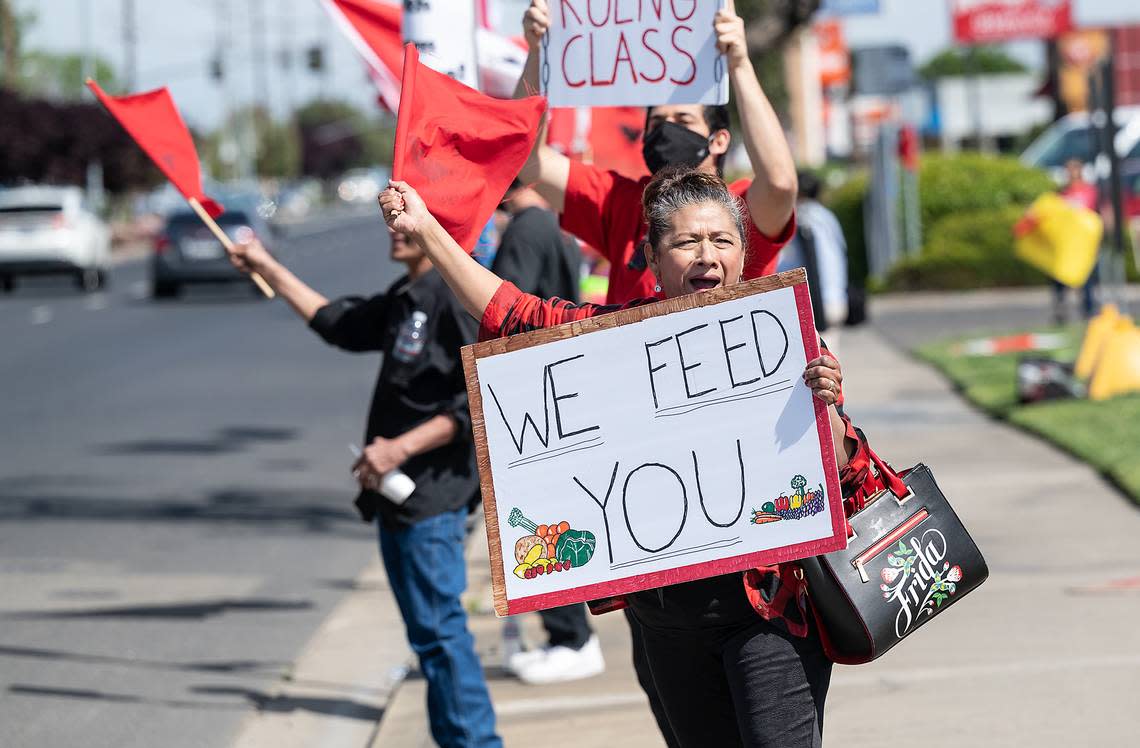Central Valley agriculture could see big changes from California farmworker union bill
California’s San Joaquin Valley could see the greatest impact from a law meant to make it easier for farmworkers to vote in union elections, a regional labor expert said.
On Wednesday, Gov. Gavin Newsom signed into law a United Farm Workers-backed bill that intends to make it easier for farmworkers across California to vote in union elections and, ultimately, join collective bargaining contracts. Newsom’s signature comes after months of pressure and advocacy from the United Farm Workers and allies, who marched across the Central Valley to Sacramento and then held overnight vigils in support of the bill.
The newly signed law is accompanied by a supplemental agreement between the Newsom administration, the UFW and the California Labor Federation to pass clarifying language during next year’s legislative session “to address Governor Newsom’s concerns around implementation and voting integrity.” The proposed changes remove language allowing farmworkers to vote by mail-in ballot – previously a major goal of the legislation.
Last month, a spokesperson for the governor said he could not support “an untested mail-in election process that lacks critical provisions to protect the integrity of the election.”
Still, supporters say the agreement is a win for both labor and farmworkers.
Roughly half of California’s farmworkers live and work in the Central Valley — a region that also boasts one of the most productive agricultural regions in the nation.
While unionization rates among farmworkers have dwindled in recent years, the new law could increase the number of unionized workplaces and, ultimately, improve wages and working conditions for farmworkers, according to Edward Flores, a professor of sociology and faculty director of the UC Merced Community and Labor Center.
“We can expect that the impact is going to be much more significant in the Central Valley,” Flores said in an interview with The Bee on Thursday.
The region has “long been one of the places where workers have experienced the greatest disadvantages,” he said.
What does the farmworker union bill do?
The governor signed Assembly Bill 2183 on the condition that changes are made during next year’s legislative session.
The law amends the Agricultural Labor Relations Act by expanding voting options for farmworkers in union elections. It allows farmworkers, beginning in 2023, to vote either at a physical location or by dropping off a ballot card at the Agricultural Labor Relations Board office, a process known as a “card check.”
The card check provision, referred to in the agreement as the Majority Support Petition, will allow employees to unionize at a workplace when a majority of workers sign cards that indicate their wish to be represented by a union.
This is a “right that public sector workers have,” Flores said.

But under the supplemental agreement, employees wouldn’t be able to vote for union representation through a mail-in voting process, as bill authors and supporters had initially proposed.
The agreement essentially narrows the scope of the law, Flores said.
“The card check provision is kept, while the ability to mail in ballots isn’t,” he said.
The agreement would also cap at 75 the number of employers that would be subject to card check petitions over the next five years.
The new provisions can either be repealed or renewed in 2028, according to the law.
In a video statement released on Twitter, UFW president Teresa Romero celebrated the news of the governor’s signature and acknowledged the changes to the initial bill.
“We will be working more with Governor Newsom and our legislators to make changes we have worked together on that will make things easier,” Romero said.
Agriculture industry group opposes California law
Ian LeMay, president of the California Fresh Fruit Association, criticized the governor’s decision to sign the bill.
“This was a disappointing action by the governor,” LeMay said in an interview with The Bee on Wednesday. “This was done to embolden the special interest group, and we’re extremely disappointed by the governor’s actions today.”
He expressed concerns about the law’s card check provision and said he would prefer workers vote for unionization by casting secret ballots or mail-in ballots, as the bill originally proposed.
The use of card check over vote-by-mail ballots, he said, “is actually the forfeiture and taking of farmworkers’ right to a private election.”
He also questioned why supporters had framed the bill as a mail-in ballot measure.
“Why was that the talking point for the proponents for a whole year?” he said. “And in the closed-door negotiations between the governor and them, now (the) fix is a card check election?”
LeMay also criticized the legislative process, saying the agricultural industry was “locked out” of negotiations regarding this bill from the beginning. The industry was also cut out of the supplementary agreement that changed the logistics and language of the bill, he added.
“We were never given the opportunity by the governor or his staff to appropriately engage on a bill that will potentially change the face of California agriculture,” LeMay said.
LeMay is confident the growers he represents will continue to follow California’s labor laws and provide jobs to employees, he said.
“Quite frankly, that in itself is why I think we have not seen mass unionization in California within agriculture, because the California state legislature has done such a good job of creating a work environment for California agriculture employees, that there is no need for a union,” he added.
Could UFW law change agricultural employer-employee dynamics?
Flores, of UC Merced, agreed the law could have important implications for the industry.
“This is something that certainly is going to shape employer-employee dynamics in the agricultural industry,” he said. That’s especially true in the Central Valley, he added, “where the working conditions have often been the most challenging and where reform is needed the most.”

But even with its narrower scope, Flores said the law could still lead to an uptick in unionization among farmworkers. Fewer than 1% of California farmworkers are unionized, according to a UC Merced analysis of a 2020 national employment survey.
“The greater the protections that workers in an industry have, the better chance they have at organizing,” he said.
And this could have ripple effects for working conditions in the industry — even among non-unionized workers, he said.
In the Central Valley, this could mean more than just improving wages, Flores said. It could also empower workers to require their employers to maintain health and safety rules, such as CalOSHA’s heat standard and wildfire smoke standards.
“These are important rules that are meant to protect the well-being of workers, but they really only take effect if workers have enough power to hold their employers accountable,” said Flores.
And unionization is “one of the most powerful ways” workers can ensure these standards are met, he said.
Valley UFW supporter celebrates law
Angel Noriega, who has been involved with the UFW for decades, celebrated the passage of the law. He marched all 335 miles of the UFW’s “March for the Governor’s Signature” in August and camped out in downtown Fresno as part of a UFW vigil in support of the measure.
“We sacrificed ourselves and exposed our lives when marching on the side of the road, risking being hit by a car or run over, or our health being affected by the fatigue,” Noriega said.
Looking back, he said those efforts were worthwhile.
“I visualize that now it will be easier for farmworkers to organize because the typical confrontation at election times will end,” Noriega said.
Noriega recalled that during the march, union coordinators asked if he would be interested in working as an organizer if the bill passed.
“I said, ‘of course, yes,’” he said. “I do see how this new rule is doing justice to farmworkers, and it’ll be much easier to organize and have a union contract protecting them and their families.”
